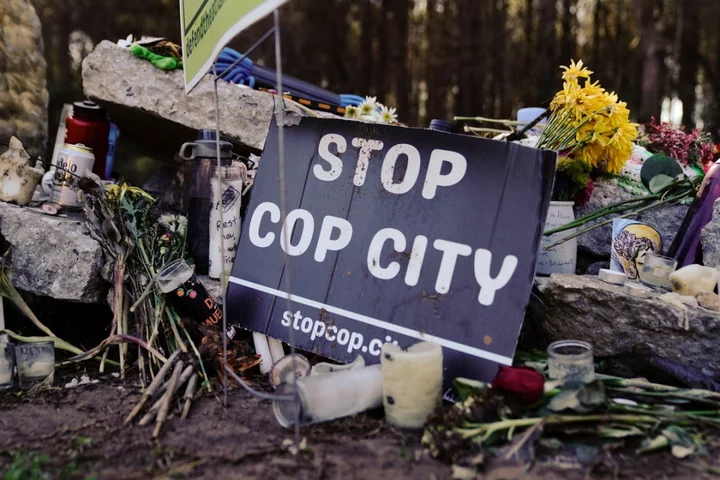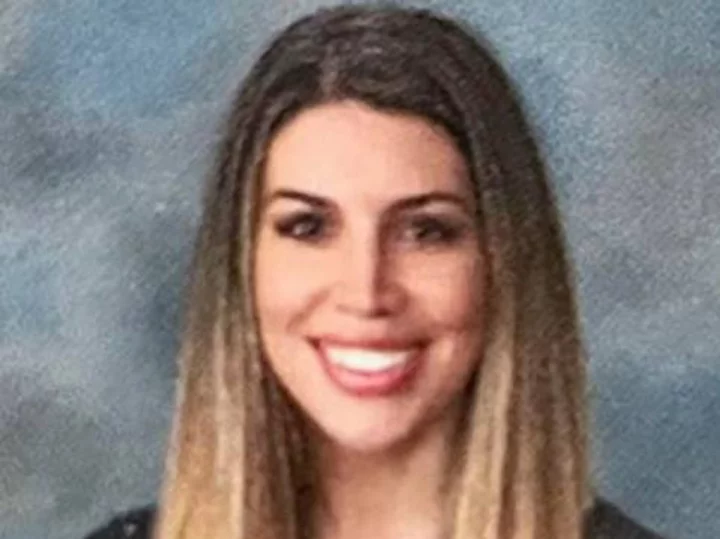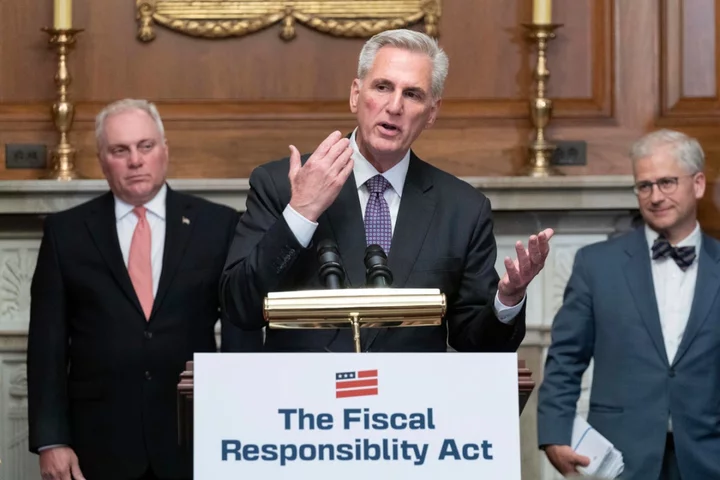
American Airlines' reliance on partners faces test after court ruling
By Rajesh Kumar Singh CHICAGO American Airlines' plan to grow revenue by relying more heavily on alliance partners
1970-01-01 08:00

Arrest of ‘Stop Cop City’ bail fund organisers is ‘alarming escalation’ of police retaliation, activists warn
Atlanta police have arrested three organisers behind a nonprofit group that provides bail and legal support to arrested protesters involved with a monthslong campaign against a sprawling, multi-million dollar law enforcement complex. Marlon Kautz, Adele Maclean and Savannah Patterson – all board members with the Atlanta Solidarity Fund – were charged with one count each of money laundering and charity fraud on 31 May. If convicted on money laundering charges, the organisers could face up to 20 years imprisonment and tens of thousands of dollars in fines. Bail fund organisers and civil rights groups have warned that the arrests mark a rapid and unconstitutional escalation of law enforcement retaliation against demonstrators involved with the “Stop Cop City” movement. Atlanta activists also fear that prosecutors are planning to indict those arrested in connection with the protests as a “criminal organisation” under Georgia’s sweeping state-level statute that has been used to target organised crime. Lauren Regan, executive director of the Civil Liberties Defense Center, called the arrests an “extreme provocation” from Atlanta Police Department and state prosecutors. “Bailing out protestors who exercise their constitutionally protected rights is simply not a crime,” she said in a statement. “In fact, it is a historically grounded tradition in the very same social and political movements that the city of Atlanta prides itself on. Someone had to bail out civil rights activists in the [1960s] – I think we can all agree that community support isn’t a crime.” The Atlanta Public Safety Training Center project has been at the centre of “Stop Cop City” protests and occupations since its proposal in 2021, expected to occupy 85 acres in a historically and environmentally significant forest area owned by the city of Atlanta. The police training facility in the South River Forest has drawn widespread opposition from environmental groups and criminal justice reform advocates. Police have arrested dozens of people during protests, including more than 40 people facing “domestic terrorism” charges. The Atlanta Solidarity Fund – among similar organisations across the country that provide bail support and legal aid – has predated the “Stop Cop City” movement and provided grants to a number of groups in the Atlanta area. The fund also has provided legal aid and bail assistance to protesters facing excessively high bonds, with some as high as $300,000. A statement from the Georgia Bureau of Investigation accuses the three arrested organisers with committing “financial crimes”; an arrest warrant for Ms Patterson connects a “money laundering” charge to reimbursements from the nonprofit to a personal PayPal account for expenses including “gasoline, forest clean-up, totes, [Covid-19] rapid tests, media, yard signs and other miscellaneous expenses.” In a statement defending the arrests, Georgia’s Republican Governor Brian Kemp called bail organisers “criminals” who “facilitated and encouraged domestic terrorism”. “As we have said before, we will not rest until we have held accountable every person who has funded, organized, or participated in this violence and intimidation,” Georgia Attorney General Chris Carr said. The arrests of the bail fund organisers on 31 May comes roughly one week after news of the project’s $67m price tag, more than double the $30m projected cost, and days before the Atlanta City Council’s anticipated vote on 5 June on whether to fund the facility. In a written statement prepared in the event of an arrest, Kautz said that criminal charges against the Atlanta Solidarity Fund “will have repercussions on the ability of movements to create change across the country,” a tactic from “a new playbook that criminalizes the coalition of advocates who are providing financial and physical support to movements.” Fair Fight Action, a voting rights organisation founded by Stacey Abrams in 2018, stressed that “legal aid groups and bail funds are, and have long been, critical resources for those seeking to make their voices heard in their communities.” “The timing of the state actions – just one week before a controversial vote – is not a coincidence,” the group said in a statement condemning the arrests. “Bail funds were integral during the Civil Rights Movement, oftentimes serving as the only path to freedom for arrested protesters. The incendiary rhetoric against and criminalization of these institutions by the Kemp administration represents an alarming escalation of tensions in the face of serious community concerns.” Sherilynn Ifill, former president and director counsel of the NAACP’s Legal Defense Fund, said the arrests “demand explanation” from Atlanta Mayor Andre Dickens and Atlanta Police Department chief Darin Schierbaum. “They may wish to recall that targeting the charitable status [and] legitimacy of groups involved in civil rights organizing has a long and ugly history in the South,” she said. “This is dangerous stuff. It is anti-democratic and menacing to organizing and protest – core protected activity in a democracy.” State Senator Josh McLaurin lambasted Mr Carr for what he called an “attempt to score cheap political points by being reckless with people’s lives.” “This empty, 1990s-style tough-on-crime bull**** is tired and dangerous,” he said. Georgia state Rep Saira Draper, whose district includes the area where the arrests were made, said she is “deeply concerned” about the case and the “grossly excessive” use of a SWAT team and helicopters to make the arrests. “What I do know is weaponizing the powers of the state for political gain is abuse of power,” she said. Atlanta City Councilmember Liliana Bakhtiari also said the case deserves “the utmost scrutiny and sensitivity as it moves through the legal process.” Read More Marjorie Taylor Green falsely claims slain Georgia activist killed police officer at Cop City protest Autopsy strengthens case that ‘Cop City’ activist didn’t fire first before being gunned down by police
1970-01-01 08:00

Rachel Levine on Congress bigots, Don’t Say Gay and life as Biden’s top trans official: ‘Despair doesn’t motivate change’
"I'm not the best person for hobbies," says Dr Rachel Levine. In her 40 years of practicing medicine, four of which were spent running the health department of the state of Pennsylvania, she has rarely had much time for recreation. Now she is not only the assistant secretary of state for health for the whole United States under president Joe Biden, but also the most senior openly transgender government official in American history. More than that, she has taken a strong line supporting trans children and transition healthcare at a time when they are under unprecedented attack. According to the non-profit Human Rights Campaign, 19 states have banned transition healthcare for under-18s, and eight more are considering doing so. Meanwhile, medics and patients – including at Boston Children's Hospital, which established the nation's first trans health programme for children and adolescents in 2007 – have received a storm of harassment and threats. "I know the people who developed that clinic. I know them all personally," says Levine, 65, who grew up in Massachusetts and still speaks with a touch of New England in her accent. "I remember when that clinic was formed... now it's under siege by people with political and ideological motivations. "So we need to support trans youth, we need to support their families and we need to support these expert providers that are providing this careful, intentional care according to well-established evidence-based standards." Levine is speaking to The Independent via Zoom from her office in Bethesda, Maryland, flanked by flags, her white hair tied tightly behind her head. As a four-star admiral in the US Public Health Service Commissioned Corps, she wears military-style blue overalls modeled on those of the US Navy and Coast Guard. She does not, she explains, consider herself to be a politician. She has never run for or been elected to office. Instead she sees herself as simply a doctor and a public servant, who now has a rare ability to advocate for her community, as well as overseeing public health areas raging from abortion rights through long Covid to the unequal impact of pollution and natural disasters. But politician or not, her identity has made her a lightning rod for criticism and, sometimes, viotriolic bigotry from anti-trans conservatives. Her name is a fixture in online extremist spaces, where her appointment is painted as part of a conspiracy to overturn traditional gender roles. "When I receive that pushback, I sublimate it," she says, using the psychological term for turning a negative mental energy towards useful ends. "I am a positive and optimistic person because I choose to be positive and optimistic. I can be pessimistic and in despair, but that doesn't motivate change." ‘Trans healthcare is medicine like any other’ Born in 1957, Levine attended an all-boy's school near Boston and studied medicine at Harvard and Tulane University, before completing her training at a hospital in New York City where she specialised in paediatrics and psychology. In 1993, in what she has called her wryly called "most difficult transition", she moved southwest to become a professor at the Penn State, a position she still holds today. In 2015, however, her life took a different turn when Pennsylvania's incoming Democratic governor Tom Wolf asked her to co-chair his health policy transition team and then to be his physician general – a job that would put her right in the merciless gaze of national politics and media. Four years earlier, after decades of "compartmentalising" her feelings, Levine had come out as a trans woman in her fifties. Yet although the backlash against trans rights was already in the offing, her appointment was unanimously confirmed by the state legislature, later becoming Pennsylvania's health secretary and leading its response to Covid-19. Her US Senate confirmation hearing in 2021 was another matter. Republican senator Rand Paul asked her whether children were capable of consenting to medical transition, falsely describing sex reassignment surgery as "genital mutilation". All 50 Democrats and two Republicans voted to confirm her, while the other 48 Republicans voted against. "My confirmation hearing was – interesting," says Levine now, with only the shortest pause, "but not unexpected, and so I was able to navigate that." She adds that although she doesn't deal frequently with Congress, most politicos have treated her "respectfully". As a paediatrician, Levine argues that treatments such as puberty blocking drugs and hormone replacement therapy (HRT) for under-18s should be treated just any other childhood medicine. (Breast removal surgery is rarely prescribed for trans teenagers, and never for younger children, while genital surgery for under-18s is almost unheard of). "Transgender care for youth is medical care; it is mental health care; it is literally suicide prevention care," says Levine. "And it is based upon a well-established standard of care which continually gets updated, as all standards of care do... "It always needs to be done carefully, usually with national or international standards, and then it's individualised to the patient and the family. That's how we do paediatric care. It is no different for transgender medicine." One supportive adult can make the difference Critics of medical transition sometimes liken gender dysphoria – that is, feelings of discomfort or horror related to one's gender – to eating disorders, arguing that both involve an irrational aversion to one's natural body. Levine, who is an expert on eating disorders, pooh-poohs that idea, saying the causes of and solutions to each condition are completely different. Although young trans people do have worse mental health on average than the US population, she says evidence shows that is not caused by being trans but by the way they are being treated by others – a problem exacerbated by anti-trans laws and rhetoric. "Young people who receive support and standard of care treatment have excellent mental health outcomes," she says. "They have depression and anxiety because they're being harassed and bullied, and they're not being allowed to transition. If you facilitate them being who they are, their mental health gets better." Nor is there any evidence, she says, for a theory widespread among anti-trans activists: that young people are being falsely persuaded that they are trans by "social contagion" from their peers. She describes an often-touted 2018 paper by medicine professor Lisa Littman, proposing that trans children may be suffering from "rapid onset gender dysphoria" (ROGD), as "flawed". A group of medical organisations including the American Psychological Association and the American Psychiatric has since warned against applying the concept of ROGD in clinical contexts, describing it as based on "unsupported claims" and likely to "stigmatise" trans people. Littman corrected her paper in 2019 after intense criticism of its methods, and the journal that published it issued an apology. "All the evidence really points to better communication and understanding about gender identity among young people, so that they understand who they are and they come out," says Levine. "There's a lexicon, there's a language, there's support. And more parents understand, and there has been more availability of treatment, and there still is availability of treatment." All of those are things Levine herself never had as a child. "I grew up in the Sixties and Seventies," she says. "There was no terminology, there was no internet, there was no Google. And so I did not understand the thoughts and feelings I was having about gender identity." Even though she had supportive adults in her life, she says there was no way to ask them about being trans because the concept was so unknown. "Who are you going to tell? And what would you have said? None of the language was there." Today she frequently touts a study by The Trevor Project, an American LGBT+ support charity, showing that having even one adult in their life who supports their gender identity can meaningfully lower a young trans person's likelihood of attempting suicide. It is why she is so concerned about Florida's so-called "Don't Say Gay" law and other similar laws, which ban teachers from discussing LGBT+ issues in public schools. "That one supportive adult might be a parent or a relative, but it might not," says Levine. "It might be a teacher, or a coach, or guidance counsellor, or someone else in the community that makes that difference... "[Florida's law] makes it so difficult for a young person to be able to talk to, potentially, that teacher or that coach or that guidance counsellor, because that person then has to immediately tell the young person's parents by that state law." While Republican state legislators seek to pass laws that would make it more difficult for trans people to get healthcare, work in education, or exist in public, a few figures have explicitly called for violence. One GOP candidate last year called for supporters of trans rights to be tried and executed for treason, while a conservative pastor said LGBT+ people should be “lined up against the wall and shot in the back of the head”. ‘Most people in the country don’t hate us’ Some trans people and supporters see all this as a potential precursor to genocide, accusing opponents of wanting to "eliminate" trans people from society by making transition all but impossible. Machaela Cavanaugh, a progressive state legislator in Nebraska, told The Independent last month that trans healthcare bans were a form of "extermination". Does Levine agree? "I would not characterise it as that," she says, although she adds: "I understand the feelings of people who say that, given the hateful rhetoric and the laws and actions being taken." There are many people in the public who have been misled, and I think they are able to be educated about the truth Rachel Levine She likewise rejects the more adversarial approach to fighting for LGBT+ rights that is pithily summarised in the slogan "the first Pride parade was a riot". Instead she sees Pride Month as an opportunity for "advocacy" – for trans people to tell their stories and help educate those who do not understand their lives. The reason, she claims, is that true bigots are merely a "vocal minority", part of a coordinated campaign by conservative think tanks and politicians who lost the argument against gay marriage and are now looking for the next "wedge issue" to divide the electorate. "We're probably not going to change their minds," she says. "But then there are many people in the public who have been misled, and I think they are able to be educated about the truth." She cites the trans author Jennifer Finney Boylan, who wrote that "it's impossible to hate anyone whose story you know", as well as the Jedi master Yoda, who intoned: "Fear leads to anger; anger leads to hate; hate leads to suffering." In other words, people fear what they don't understand – and if they understand more about actual trans people rather than the demonic caricatures of anti-trans invective, they won't go down that path. "I think this is a significant setback, which happens on the road to equality and fairness and freedom. We have seen this in many other times," she says. "So I do not think it will stand, and I think the wheel will turn. "But I do freely admit that it is very difficult and very challenging for members of our community... I think that we are strong, and I think that we are resilient, and I think that we are strong." She pauses for a moment. "But I have to tell you, I choose to believe that." Not all LGBT+ activists feel the same way. Some have accused the Biden administration not doing enough to stem the tide of anti-trans bills, while others have attacked its recent guidance on trans participation in school sports as a surrender to conservatives. Yet Levine is confident that President Biden "supports our community unconditionally", and says there has never been such strong solidarity with LGBT+ people at the top levels of any US government. She cites the President's 13-point executive order last Pride aiming to curb anti-LGBT+ discrimination, the health department's action against conversion therapy, and her work with the Office of Civil Rights to reverse Trump-era changes that weakened rules against discrimination in healthcare. At age 65, she has already seen transgender people go from complete social pariahs, living in the shadows of a society that made no provision for them, to having access to medical transition and at least a chance – sometimes a good chance – of being fulfilled and successful while being open about who they are. So if and when she does have time for hobbies again, what would she do? "I would like to have more time to meditate," she says. "I have meditated in the past and it's pretty hard to add it to my current day, but I have found mindfulness and meditation to be very helpful." Hikes and long walks, too, would be on her agenda. "I used to run," she adds, a little wistfully. "Now I walk." Read More Thousands march in Jerusalem Pride parade, first under Israel's most right-wing government ever LGBT+ flags vandalised for a fourth time at Canada church on eve of Pride Month LGBTQ+ people flock to Florida for Gay Days festival Pride profile: I will be the first asexual grand marshal at NYC’s Pride March Rufus Gifford: The gay man serving as the ‘American welcome’ to foreign leaders Kershaw disagrees with Dodgers’ decision to reinstate gay ‘nun’ group for Pride Night
1970-01-01 08:00

Florida teacher, 26, killed in suspected murder-suicide with 10-month-old baby rescued from crib
A Florida school teacher was killed in an apparent murder-suicide with her 10-month-old baby discovered crying and unharmed in a crib. Amanda Hicks, 26, was found stabbed to death on 27 May after police went to an apartment in Port St Lucie to carry out a welfare check that had been requested by the family of an adult male. Port St Lucie police say that when officers arrived at the home in Peacock Run Apartments they could hear the infant crying inside and when they entered discovered Hicks and the male - later identified as Hicks’ fiancé, dead on the floor from a gunshot wound. The baby was removed from the property and placed with a family member. Investigators said in a statement that Hicks “was killed by an adult male who then took his own life.” Police say that Hicks and the unidentified 25-year-old were “romantically involved.” Port St Lucie Police Sgt John Dellacroce told Fox News Digital that the man had repeatedly called a family member who didn’t pick up the phone - with the final call taking place at 11.50pm. About an hour later, the sound of a gunshot was captured on surveillance video. “His family member didn’t answer the phone and saw all these missed calls the next morning and tried to call him back but couldn’t get a hold of him,” Mr Dellacroce said. He said the relative called police to request a welfare check as soon as they say the missed calls the next morning. Hicks was a sixth-grade reading teacher at Dr David L Anderson Middle School in Martin County, school officials confirmed. In a message sent to parents and staff, school principal Darcia Borel said that Hick’s death was a tragedy. “It is with great sadness that we write to inform you about the tragic passing of one of our teachers, Ms Amanda Hicks,” Ms Borel wrote. “The Port St Lucie Police Department has confirmed that Ms Hicks was the victim of a homicide. While words will never be enough to convey the shock and sadness this news has brought to our school family, it is more important than ever to come together to support one another through our grief journey.” Read More Tourists flee Florida beach in terror as gunshots ring out in harrowing video of Hollywood shooting Hollywood beach shooting – live: Photos show suspects on the run after nine shot on Florida boardwalk A sunny Memorial Day at the beach upended by gunfire: What we know about the shooting in Hollywood, Florida
1970-01-01 08:00

Texas ‘serial killer’ admits to two murders after calling police to turn himself in: ‘You’re looking for me’
A suspected “serial killer” and convicted child rapist was arrested in Austin, Texas, days after he identified himself in a chilling phone call to police. Austin Police Department and Texas’ Lone Star Fugitive Task Force apprehended Raul Meza Jr, 62, at bus stop near Parmer Lane on 29 May, days after he confessed to killing his 80-year-old roommate Jesse Fraga in Pflugerville last month. During a 14-minute phone call, on 24 May, Meza also implicated himself in the 2019 murder of Gloria Lofton at her home in Austin. “My name is Raul Meza and you’re looking for me,” Meza said on the call, Detective Patrick Reed told a press conference on Tuesday 30 May. Meza then detailed his relationship with Fraga and the manner in which he murdered him, including details that had not been made public, Mr Reed said. Fraga’s body was discovered at his home with a belt around his neck on 20 May after the former probation officer’s family requested a welfare check over concerns they hadn’t spoken to him in over a week. Meza reportedly fled the scene with Fraga’s car. Austin Police Sergeant Nathan Sexton added that the Travis County medical examiner noted a puncture mark on Fraga’s neck and a severed cervical spine. Meza also told Mr Reed he had been in and out of prison, adding: “I got out in 2016, I end up murdering a lady soon afterwards. It was on Sara Drive.” Based on details provided by Meza as well as medical information, Mr Reed and his partner Detective Katy Conner identified Meza’s second victim as Lofton, who was strangled on 9 May 2019. “I will let you know that Mr Meza said he was ready and prepared to kill again and he was looking forward to it,” Mr Reed informed the press. After his arrest, Meza was charged with two counts of capital murder, but authorities said they are investigating his ties to “multiple cold cases that have a similar M.O. [modus operandi]”. In 1982, Meza pled guilty to the rape and murder of eight-year-old Kendra Page while she was riding her bike near Langford Elementary School. He was sentenced to 30 years in prison but was released on parole in 1993, after serving 11 years. During the press conference on Tuesday, Deputy US Marshall Brandon Filla described Meza as “the worst of the worst” while interim assistant city manager Bruce Mills said it was a “travesty of justice” Meza had been allowed back on the streets. In an interview with KVUE, Kendra’s sister Shawn Page reacted to the news of Meza’s arrest. Explaining how her family tried to keep Meza in prison, Shawn said: “To find out this has happened to so many other people, it’s a tragedy. My dad knew he was dangerous, and no one would listen to us.” Meza’s rap sheet dates back to 1975, when he robbed a convenience store in Austin with three other teenagers. Meza, 14 at the time, shot the store attendant Derly Ramirez, paralysing him. In 1976, he was reportedly sentenced to 20 years in jail for aggravated robbery before being released on parole in 1981. Meza is being held in Travis County Jail. If you have been raped or sexually assaulted, you can contact your nearest Rape Crisis organisation for specialist, independent and confidential support. For more information, visit their website here. Read More Cameron Robbins: Search called off for teen who ‘jumped off cruise ship as a dare’ Debt ceiling news – live: House votes to approve McCarthy-Biden deal as opposition collapses Iowa building collapse – live: Survivor lost leg in rescue as two others feared trapped in Davenport wreckage Jeffrey Epstein’s island: What really happened there? Trump news – live: Trump ‘caught on tape’ discussing classified papers, trashes DeSantis and Christie
1970-01-01 08:00

This West Bank city used to be an oasis of calm. Not anymore
The palm trees that line the roads in this desert city near the Dead Sea have been famous for millennia: "The plain of the Valley of Jericho, the city of palm trees," as written in Deuteronomy in the Old Testament.
1970-01-01 08:00

Trump news – live: Trump caught on tape revealing he kept classified papers after presidency, report says
In a bombshell development in the classified documents case against Donald Trump, a report by CNN says federal prosecutors have obtained an audio recording of a summer 2021 meeting in which the former president acknowledges he held onto a classified Pentagon document about a potential attack on Iran — potentially undercutting his argument that he declassified everything. The recording indicates Mr Trump understood he retained classified papers after leaving the White House and suggests he would like to share the information but is aware of limitations on his ability post-presidency to declassify records. The network cites multiple sources. Special Counsel Jack Smith, who is investigating the classified papers case, is also looking at the former president’s efforts to overturn his 2020 election loss. In a new development he is examining Mr Trump’s firing of cybersecurity official Christopher Krebs, whose office said the vote was secure, The New York Times reports. Mr Krebs was fired by Mr Trump shortly after the election. Meanwhile, as more Republican contenders join the party’s primary race, Mr Trump has promised a year-long celebration of America to mark 250 years of independence if he wins the presidency again. Read More Trump caught on tape discussing classified documents he kept after leaving White House, reports say Trump legal team asks for judge in hush-money case to be removed Trump accuses DeSantis of faking his own name in wave of attacking social media posts
1970-01-01 08:00

Trump accuses DeSantis of faking his own name in wave of attacking social media posts
Former president Donald Trump escalated his attacks on competitor Ron DeSantis as the Florida governor began his presidential campaign in Iowa following his glitch-laden Twitter announcement. The 45th president on Wednesday claimed that Mr DeSantis was looking to "change his name". "Have you heard that 'Rob' DeSanctimonious wants to change his name, again," Mr Trump wrote on his social media platform Truth Social. "He is demanding that people call him DeeeSantis, rather than DaSantis. Actually, I like “Da” better, a nicer flow, so I am happy he is changing it. "He gets very upset when people, including reporters, don’t pronounce it correctly. Therefore, he shouldn’t mind, DeSanctimonious?" The Florida governor pronounced his name both as “dee-santus and “duh-santus", but reportedly settled on the latter. Mr Trump in a subsequent post, wrote: "ELECTION INTERFERENCE!" The one-time president continued his diatribe against Mr DeSantis by reposting a statement from Republican representative Mike Keyy, accusing the governor of “ingratitude” after Trump endorsed him in 2018. "There was a time when Ron DeSantis begged for president Trump's support. Our president gave Mr DeSantis that put him in a position to win the Florida governor's race...," the statement read. Mr Trump persisted. He then shared a post with a link to an article that called Mr DeSantis a "Trump knockoff". That followed another post linked to an article calling Mr Trump’s support “unmovable". A third post with a link claimed "Trump showed that he can capably lead America and protect the unborn”. Mr DeSantis, meanwhile, blitzed through Iowa during his first full day of presidential campaigning, stepping up his verbal swipes at the former president. The governor accused MrTrump of abandoning “America First” principles on immigration, supporting coronavirus pandemic-related lockdowns and generally having “moved Left”. Mr DeSantis also laughed off frequent criticism from the former president over his leadership in Florida, particularly on the state’s response to Covid-19. “Hell, his whole family moved to Florida under my governorship,” Mr DeSantis said. “This is a different guy than 2015, 2016,” Mr DeSantis previously told The Daily Wire, a conservative news website. Read More Reports: Prosecutors have tape of Trump discussing holding onto classified doc after leaving office Trump news - live: Trump caught on tape revealing he kept classified papers after presidency, report says DeSantis news – live: Florida governor attacks ‘wokeness’ but avoids saying Trump’s name at Iowa rally Ivanka and Jared split over attending Trump 2024 launch – follow live Why was Donald Trump impeached twice during his first term? Four big lies Trump told during his 2024 presidential announcement
1970-01-01 08:00

After sailing though House on bipartisan vote, Biden-McCarthy debt ceiling deal now goes to Senate
Veering away from a default crisis, the House overwhelmingly approved a debt ceiling and budget cuts package, sending the deal that President Joe Biden and Speaker Kevin McCarthy negotiated to the Senate for swift passage in a matter of days, before a fast-approaching deadline. The hard-fought compromise pleased few, but lawmakers assessed it was better than the alternative — a devastating economic upheaval if Congress failed to act. Tensions ran high as hard-right Republicans refused the deal, but Biden and McCarthy assembled a bipartisan coalition to push to passage on a robust 314-117 vote late Wednesday. “We did pretty dang good,” McCarthy, R-Calif., said afterward. Amid deep discontent from Republicans who said the spending restrictions did not go far enough, McCarthy said it is only a “first step." Biden, watching the tally from Colorado Springs where Thursday he is scheduled to deliver the commencement address at the U.S. Air Force Academy, phoned McCarthy and the other congressional leaders after the vote. In a statement, he called the outcome “good news for the American people and the American economy.” Washington is rushing after a long slog of debate to wrap up work on the package to ensure the government can keep paying its bills, and prevent financial upheaval at home and abroad. Next Monday is when the Treasury has said the U.S. would run short of money and risk a dangerous default. Biden had been calling lawmakers directly to shore up backing. McCarthy worked to sell skeptical fellow Republicans, even fending off challenges to his leadership, in the rush to avert a potentially disastrous U.S. default. A similar bipartisan effort from Democrats and Republicans will be needed in the Senate to overcome objections. Overall, the 99-page bill would make some inroads in curbing the nation’s deficits as Republicans demanded, without rolling back Trump-era tax breaks as Biden wanted. To pass it, Biden and McCarthy counted on support from the political center, a rarity in divided Washington. A compromise, the package restricts spending for the next two years, suspends the debt ceiling into January 2025 and changes some policies, including imposing new work requirements for older Americans receiving food aid and greenlighting an Appalachian natural gas line that many Democrats oppose. It bolsters funds for defense and veterans, and guts new money for Internal Revenue Service agents. Raising the nation's debt limit, now $31 trillion, ensures Treasury can borrow to pay already incurred U.S. debts. Top GOP deal negotiator Rep. Garret Graves of Louisiana said Republicans were fighting for budget cuts after the past years of extra spending, first during the COVID-19 crisis and later with Biden's Inflation Reduction Act, with its historic investment to fight climate change paid for with revenues elsewhere. But Republican Rep. Chip Roy, a member of the Freedom Caucus helping to lead the opposition, said, “My beef is that you cut a deal that shouldn’t have been cut.” For weeks negotiators labored late into the night to strike the deal with the White House, and for days McCarthy has worked to build support among skeptics. At one point, aides wheeled in pizza at the Capitol the night before the vote as he walked Republicans through the details, fielded questions and encouraged them not to lose sight of the bill’s budget savings. The speaker has faced a tough crowd. Cheered on by conservative senators and outside groups, the hard-right House Freedom Caucus lambasted the compromise as falling well short of the needed spending cuts, and they vowed to try to halt passage. A much larger conservative faction, the Republican Study Committee, declined to take a position. Even rank-and-file centrist conservatives were unsure, leaving McCarthy searching for votes from his slim Republican majority. Ominously, the conservatives warned of possibly trying to oust McCarthy over the compromise. One influential Republican, former President Donald Trump, held his fire: "It is what it is,” he said of the deal in an interview with Iowa radio host Simon Conway. House Democratic leader Hakeem Jeffries said it was up to McCarthy to turn out Republican votes in the 435-member chamber, where 218 votes are needed for approval. As the tally faltered on an afternoon procedural vote, Jeffries stood silently and raised his green voting card, signaling that the Democrats would fill in the gap to ensure passage. They did, advancing the bill that hard-right Republicans, many from the Freedom Caucus, refused to back. “Once again, House Democrats to the rescue to avoid a dangerous default,” said Jeffries, D-N.Y. “What does that say about this extreme MAGA Republican majority?” he said about the party aligned with Trump’s ”Make America Great Again” political movement. Then, on the final vote hours later, Democrats again ensured passage, leading the tally as 71 Republicans bucked their majority and voted against it. The nonpartisan Congressional Budget Office said the spending restrictions in the package would reduce deficits by $1.5 trillion over the decade, a top goal for the Republicans trying to curb the debt load. In a surprise that complicated Republicans' support, however, the CBO said their drive to impose work requirements on older Americans receiving food stamps would end up boosting spending by $2.1 billion over the time period. That's because the final deal exempts veterans and homeless people, expanding the food stamp rolls by 78,000 people monthly, the CBO said. Liberal discontent, though, ran strong as nearly four dozen Democrats also broke away, decrying the new work requirements for older Americans, those 50-54, in the food aid program. Some Democrats were also incensed that the White House negotiated into the deal changes to the landmark National Environmental Policy Act and approval of the controversial Mountain Valley Pipeline natural gas project. The energy development is important to Sen. Joe Manchin, D-W.Va., but many others oppose it as unhelpful in fighting climate change. On Wall Street, stock prices were down Wednesday. In the Senate, Democratic Majority Leader Chuck Schumer and Senate Republican leader Mitch McConnell are working for passage by week's end. Schumer warned there is ”no room for error." Senators, who have remained largely on the sidelines during much of the negotiations, are insisting on amendments to reshape the package. But making any changes at this stage seemed unlikely with so little time to spare before Monday's deadline. ___ AP White House Correspondent Zeke Miller, AP writers Mary Clare Jalonick, Seung Min Kim and Jill Colvin and video journalist Nathan Ellgren contributed to this report. Read More Ukraine war’s heaviest fight rages in east - follow live Charity boss speaks out over ‘traumatic’ encounter with royal aide Debt ceiling deal advances pipeline and tweaks environmental rules. But more work remains. Republicans get their IRS cuts; Democrats say they expect little near-term impact Progressives and conservatives complain as Biden-McCarthy debt deal passes
1970-01-01 08:00

Marjorie Taylor Greene unleashes conspiracy theory that FBI really knows who the Jan 5 pipe bomber is
Marjorie Taylor Greene has claimed without providing evidence that the FBI actually knows the identity of a person who left two pipe bombs near the Capitol a day before the Jan 6 insurrection. Investigators said they have been left stumped in trying to identify a suspect who placed the explosive devices outside the Republican National Committee and Democratic National Committee headquarters in Washington DC. Despite offering a $500,000 reward, the FBI is no nearer to making an arrest in the case, but that has not stopped Ms Greene from suggesting they actually know who did it. The far-right lawmaker from Georgia made the outrageous claim on her Battleground podcast. “The FBI can’t find the pipe bomber? This is ridiculous! This shows you that the FBI doesn’t care about finding the pipe bomber because they know exactly who the pipe bomber is,” she said. “And they use their resources and your hard-earned tax dollars to go after people because they support Trump and were mad about the election of 2020 and these people walked into the Capitol.” In January, David Sundberg, the assistant director in charge of the FBI’s Washington field office, said that for two years “a dedicated team of FBI agents, analysts, and law enforcement partners have been tirelessly reviewing evidence and digital media related to this case”. The FBI, the Bureau of Alcohol, Tobacco, Firearms and Explosives and Washington police had “conducted approximately 1,000 interviews, visited more than 1,200 residences and businesses, collected more than 39,000 video files, and assessed nearly 500 tips”, according to the bureau. “In raising the reward for information about the pipe bomb suspect from $100,000 to as much as $500,000, the FBI and our partners are seeking to encourage the American public to take a fresh look at our Seeking Information website, which includes images and video of the suspect, the suspect’s backpack, the suspect’s shoes, the explosive devices, and a map of the route the suspect walked the night the pipe bombs were placed,” the FBI said. Read More Marjorie Taylor Greene faces waves of mocking laughter after asking House to follow ‘decorum’ Gavin Newsom mocks Marjorie Taylor Greene in spat over Target pulling Pride products: ‘Are you the space laser person?’
1970-01-01 08:00

House votes to back Biden-McCarthy debt ceiling deal despite Republican threats to derail it
The House of Representatives has voted to raise the debt limit, thereby ensuring the United States will avoid defaulting on its debt, despite vocal opposition from many Republicans in the House majority. The legislation had resulted from negotiations between lieutenants of House Speaker Kevin McCarthy and the White House. The passage of the legislation is the first major hurdle to be cleared for Mr McCarthy, who made a series of concessions on how to negotiate the debt limit during the marathon 15 votes it took for him to become speaker in January. The Senate will take up the legislation for a vote and Senate Majority Leader Chuck Schumer has pledged it will pass before 5 June, when Treasury Secretary Janet Yellen has warned that the United States will run out of options to maintain its debt obligations. Multiple Republicans vehemently criticised the bill, saying it did not go far enough in its spending cuts as well as highlighting the fact it raised the debt limit until January 2025, rather than raising it a certain dollar amount. Rep Garret Graves (R-LA), one of the chief negotiators with the White House, said that conservative criticism ignored the fact that had it not been for the agreement, the White House would have likely raised the debt limit unilaterally or Democrats would have teamed up with moderate Republicans to raise the debt limit without spending cuts. “So by doing so all you're doing is playing into the hands of the White House,” he told The Independent. “Because if you keep going down this road, if you keep trying to sew this line, that's simply not true that there's some other option out there to save a gazillion dollars, all you're doing is you're moving towards default.” But several House conservatives criticised the bill for multiple provisions, including the fact it did not put in place work requirements for Medicaid. The agreement increases the age for work requirements for the Supplemental Nutrition Assistance Program (SNAP), formerly known as food stamps, for able-bodied adults without dependent children from 50 to 54. That earned the criticism of many progressive Democrats and led to them opposing the bill. At the same time, the agreement would exempt youth in the foster care system, veterans and people experiencing homelessness from work requirements for SNAP and the Congressional Budget Office estimated that approximately 78,000 would gain benefits in an average month as a result of the deal. But Rep Byron Donalds (R-FL) criticised the legislation for not going far enough in work requirements such as including them for Medicaid. “And I think that's just a smart and prudent thing to do,” he told The Independent. “But when you expand eligibility for the program, at least the way CBO is putting it we're actually taking a step backwards.” Read More What’s in the cliffhanger deal struck by Biden and McCarthy to raise the debt limit? Anti-poverty groups and progressives blast work requirements for aid to poor Americans in debt ceiling deal
1970-01-01 08:00

The untold tale of America's first spelling bee victor
Marie Bolden, a black teenager, won the first US spelling bee in 1908. Her win was eclipsed by racism.
1970-01-01 08:00
